Logical Abductivism: Challenges and Prospects (with E. Brendel & F. Mancini) <paper>
Inductive Metaphysics: Insights, Challenges, and Prospects, London & New York, Routledge, 2025 (Hüttemann & Schurz eds.)
Abstract
Logical abductivism is the view that rational theory choice in logic occurs through an abductive method: our justification for accepting a logical theory relies on whether that theory outperforms alternative theories on some relevant criteria. This contribution examines the core principles of logical abductivism, focusing on some core abductive criteria and their role in theory choice (Sections 6.1 and 6.2). Section 6.3 explores the limitations of logical abductivism through the contrasting applications of it by two philosophers, Graham Priest, and Timothy Williamson. Using broadly the same abductive method, they arrive at divergent conclusions: Priest endorses a paraconsistent logic, while Williamson endorses classical logic. It is argued that this divergence stems primarily from di!ering views on the nature of logical data and their underlying metaphysical commitments. This highlights a key limitation of abductivism: its dependence on extralogical assumptions, making it non-neutral in guiding logical theory choice. Section 6.4 deals with two epistemological challenges to logical abductivism: the Adoption Problem, which questions whether certain basic logical principles can be adopted, and the Background Logic Problem, which highlights the circularity in revising fundamental logical principles while relying on them for such revisions. Section 6.5 concludes the contribution by discussing prospects for logical abductivism.
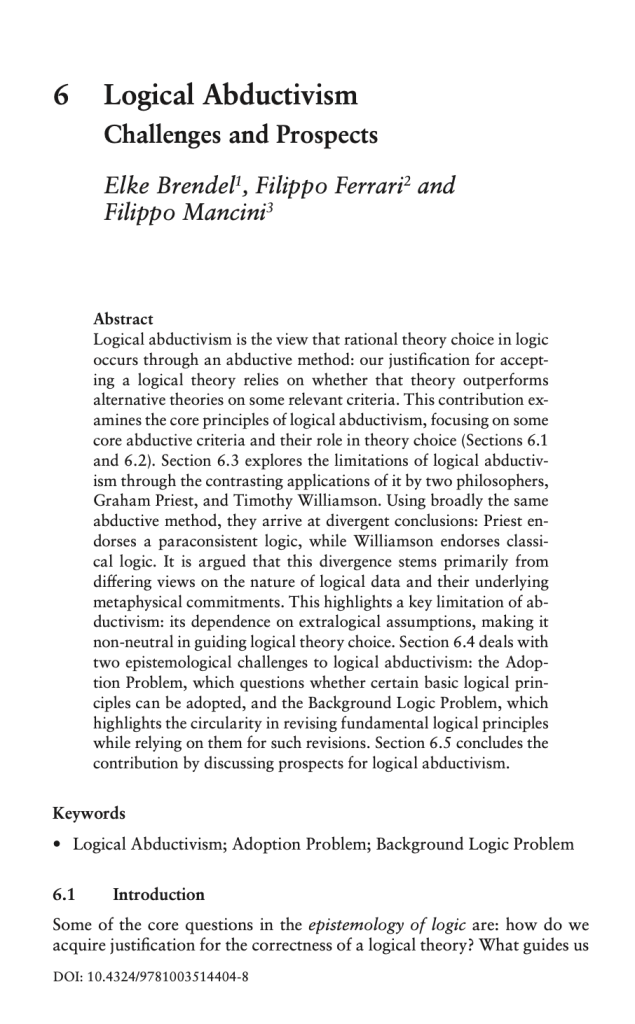
The Normative Profile of Agnosticism (with G. Susanna) <paper>
Suspension in Epistemology and Beyond, London & New York: Routledge, 2025 (Wagner & Zinke eds.)
Abstract
In this chapter, we build on Ferrari and Incurvati’s work in The Varieties of Agnosticism, where they use a question-and-answer heuristic to identify various agnostic stances. Our focus in this chapter is on examining the criteria of correctness for forming the minimal agnostic attitude and its various stances. The first goal is to explore the relationship between a subject’s agnosticism and the norms that govern their inquiry practices. In doing so, we distinguish between input norms (i.e., norms governing the formation of a mental attitude) and management norms (i.e., norms governing the maintenance and relinquishment of mental attitudes). We then apply this framework by analyzing two case studies from the philosophy of mathematics: Goldbach’s Conjecture and the Continuum Hypothesis. We conclude by observing that different agnostic stances are associated with distinct management norms.

Non-Ideal Epistemology (with S. Moruzzi) <paper>
Rivista di Filosofia 115(2): 319-339 — 2024
Abstract
In this paper we investigate whether and to what extent scientists (e.g. inquirers such as epidemiologists or virologists) can have rational and fruitful disagreement with what we call post-enquirers (e.g. conspiratorial anti-vaxxers) on topics of scientific relevance such as the safety and efficacy of vaccines. In order to accomplish this aim, we will rely and expand on the epistemological framework developed in detail in Ferrari & Moruzzi (2021) to study the underlying normative profile of enquiry and post-enquiry. We take it that our analysis provides an effective explanation of why standard argumentative strategies such as fact-checking and debunking cannot work in the context of disagreement between scientists and denialists unless they are coupled with a discussion of the values that are endorsed by the scientific community.

Post-Enquiry and Disagreement (with S. Moruzzi) <paper>
Social Epistemology 37(2): 177-196 — 2023
Abstract
In this paper we investigate whether and to what extent scientists (e.g. inquirers such as epidemiologists or virologists) can have rational and fruitful disagreement with what we call post-enquirers (e.g. conspiratorial anti-vaxxers) on topics of scientific relevance such as the safety and efficacy of vaccines. In order to accomplish this aim, we will rely and expand on the epistemological framework developed in detail in Ferrari & Moruzzi (2021) to study the underlying normative profile of enquiry and post-enquiry. We take it that our analysis provides an effective explanation of why standard argumentative strategies such as fact-checking and debunking cannot work in the context of disagreement between scientists and denialists unless they are coupled with a discussion of the values that are endorsed by the scientific community.

Disagreement and Suspended Judgement <paper>
Metaphilosophy 53(4): 526-42 — 2022
Abstract
Can someone who suspends judgement about a certain proposition
be in a relational state of disagreement with someone who believes
as well as with someone who disbelieves? This paper argues for an affirmative answer. It develops an account of the notions of suspended judgement and disagreement that explains how and why the suspender is in a relational state of disagreement with both the believer and the disbeliever about the very same proposition. More specifically, the paper first provides a characterisation of the normative profile associated with the state of suspended judgement in terms of the set of normative commitments that it engenders in the context of inquiry. It then provides a characterisation of the notion of disagreement in terms the incompatibility between the sets of normative commitments characteristic of the three states in question— belief, disbelief, and suspension.
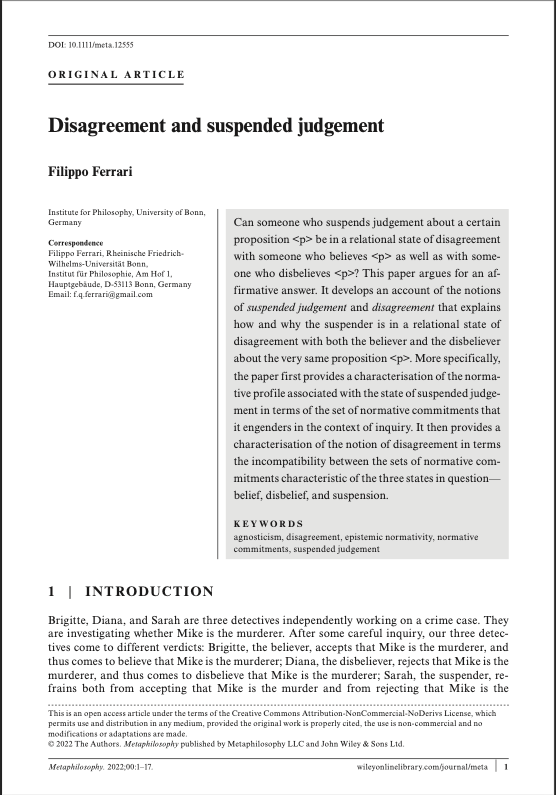
The Varieties of Agnosticism (with L. Incurvati) <paper>
The Philosophical Quarterly 72 (2): 365-380 — 2021
Abstract
We provide a framework for understanding agnosticism. The framework accounts for the varieties of agnosticism while vindicating the unity of the phenomenon. This combination of unity and plurality is achieved by taking the varieties of agnosticism to be represented by several agnostic stances, all of which share a common core provided by what we call the minimal agnostic attitude. We illustrate the fruitfulness of the framework by showing how it can be applied to several philosophical debates. In particular, several philosophical positions can be aptly conceived of as instances of agnosticism whilst retaining their differences and distinguishing features.
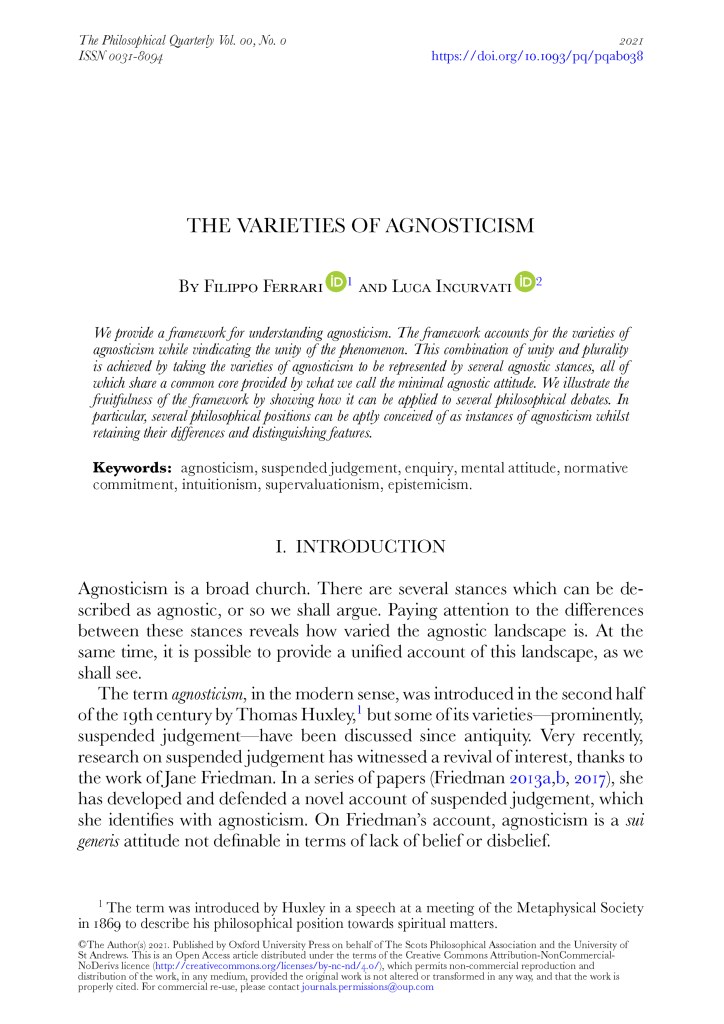
Enquiry and Normative Deviance (with S. Moruzzi) <paper>, <draft>
The Epistemology of Fake News
Oxford University Press — 2021
Abstract
Science denialism is a widespread and worrying phenomenon. Rejection of standard scientific theories targets several areas of enquiry. Our main thesis of is that science denialism brings about an aberrant form of enquiry—that we shall call post-enquiry—in which the epistemic norms governing scientific enquiry are deviated in significant ways.We offer an in-depth analysis of the epistemic mechanisms underpinning the normative deviances brought about by science denialism.

Alethic Pluralism and the Value of Truth <paper>, <draft>
Synthese 199: 55-77 — 2021
Abstract
I have two objectives in this paper. The first is to investigate whether, and to what extent, truth is valuable. The second is to discuss how pluralistic accounts of the nature of truth may deal with the value of truth in light of what I call the axiological variability conjecture (AVC)—i.e. the way in which truth is valuable varies significantly from domain to domain. Focusing primarily on Lynch’s “Manifestation Alethic Pluralism”, I argue that it lacks the resources to account for AVC and I develop some suggestions on how to improve Lynch’s view as to account for AVC.

Austere Truth Pluralism (with S. Moruzzi and N.J.L.L Pedersen) <draft>
The Nature of Truth – MIT Press — 2020
Abstract
Moderate pluralism is the dominant view in the truth pluralism debate. This paper aims to show that austere pluralism—a form of strong truth pluralism—should be taken seriously as a contender in the pluralist landscape.We introduce and articulate austere pluralism, a novel form of strong pluralism and show that it is entirely adequate for capturing the core idea of pluralism. We also argue that austere pluralism fares better than moderate pluralism with respect to ontological parsimony, an important theoretical virtue.
Keywords
Truth • Pluralism • Expressivism • Propositions
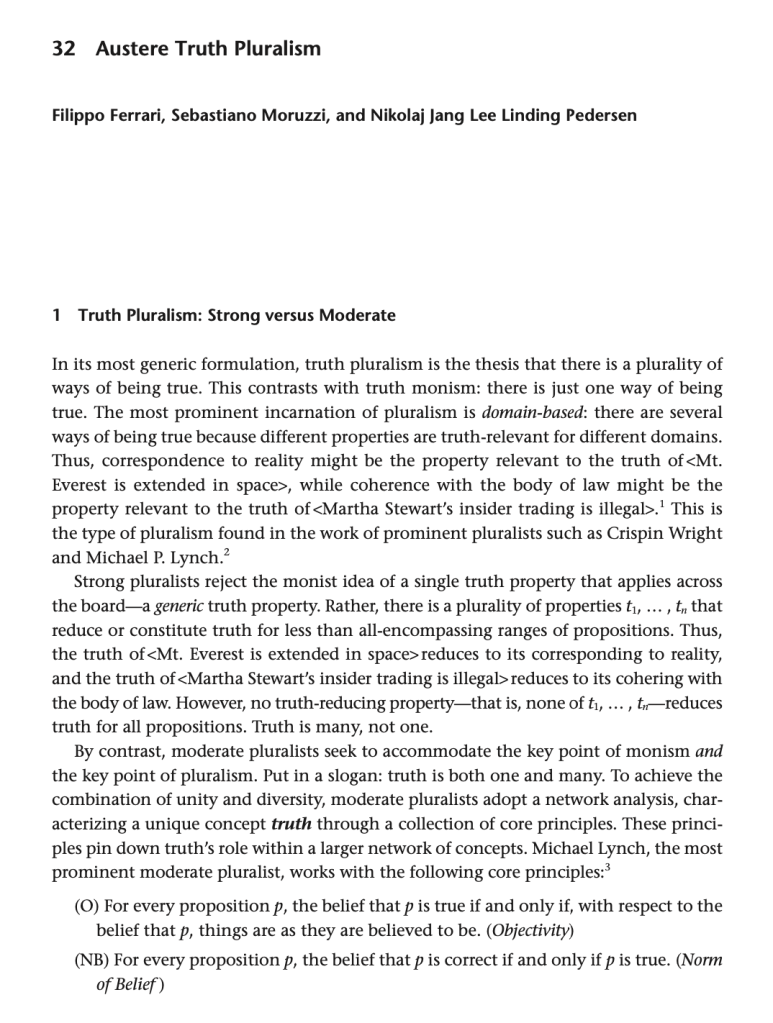
Deflating Truth about Taste (with S. Moruzzi) <draft> <paper>
The American Philosophical Quarterly
Vol. 57 (4) 2020
Abstract
Crispin Wright has argued that truth cannot be as metaphysically insubstantive as deflationists claim because it is a distinctively normative property. We offer a reconstruction of Wright’s Inflationary Argument (IA) aimed at highlighting what are the steps required to establish its inflationary conclusion. We argue that if a certain metaphysical and epistemological view of a given subject matter is accepted, a local counterexample to IA can be constructed. We focus on the domain of basic taste and we develop two variants of a subjectivist and relativist metaphysics and epistemology that seem palatable in that domain. This result shows that the success of IA requires certain substantial metaphysical and epistemological principles and that, consequently, a proper assessment of IA cannot avoid taking a stance on the metaphysics and the epistemology of the domain where it is claimed to be successful.
Keywords
Deflationist • Normativity • Truth • Pluralism • Taste • Metaphysics • Epistemology

Proof-theoretic pluralism (with E. Orlandelli) <paper>
Synthese 198: 4879-4903 — 2021
Abstract
Starting from a proof-theoretic perspective, where meaning is determined by the inference rules governing logical operators, we aim at developing a proof-theoretic alternative to the model-theoretic meaning-invariant logical pluralism of Beall and Restall (2006). We will also outline how this framework can be easily extended to include a form of meaning-variant logical pluralism. This novel framework—two-level proof-theoretic pluralism—is much broader in scope than the one discussed in Beall and Restall’s book.
Keywords
Logical pluralism • Proof-theory • Harmony
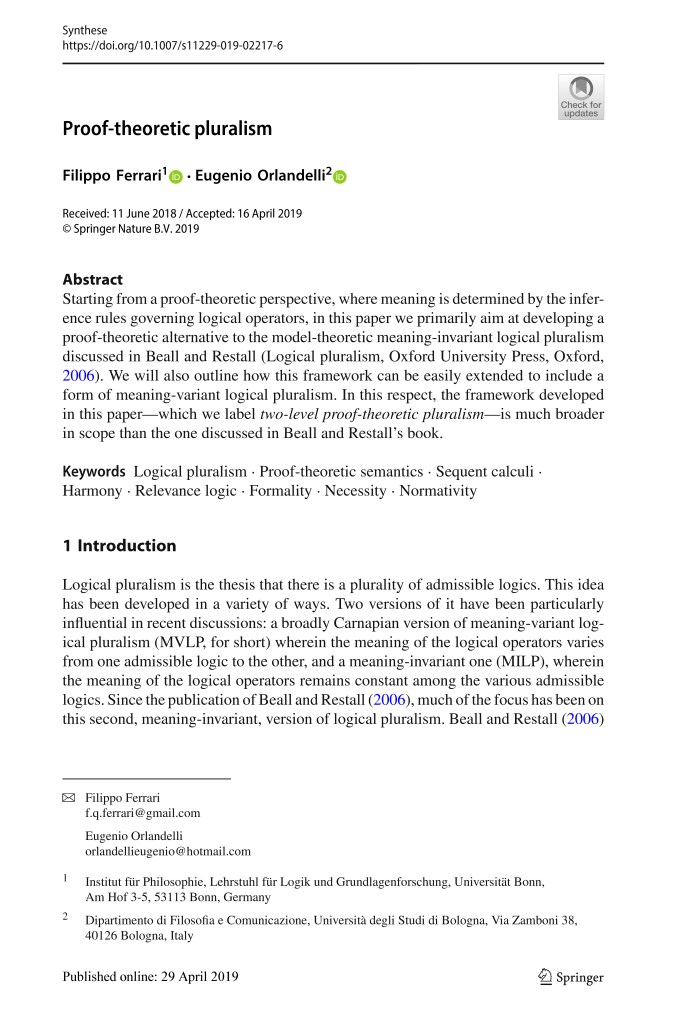
Ecumenical Alethic Pluralism (with S. Moruzzi) <paper>, <draft>
Canadian Journal of Philosophy (2019)
Vol. 49 (3): 368–393
Abstract
Ecumenical Alethic Pluralism (EAP) is a novel kind of alethic pluralism. It is ecumenical in that it widens the scope of alethic pluralism by allowing for a normatively deflated truth property alongside a variety of normatively robust truth properties. We establish EAP by showing how Wright’s Inflationary Arguments fail in the domain of taste, once a relativist treatment of the metaphysics and epistemology of that domain is endorsed. EAP is highly significant to current debates on the nature of truth insofar as it involves a reconfiguration of the dialectic between deflationists and pluralists.
Keywords
Truth • Pluralism • Deflationism • Relativism • Normativity • Tatste
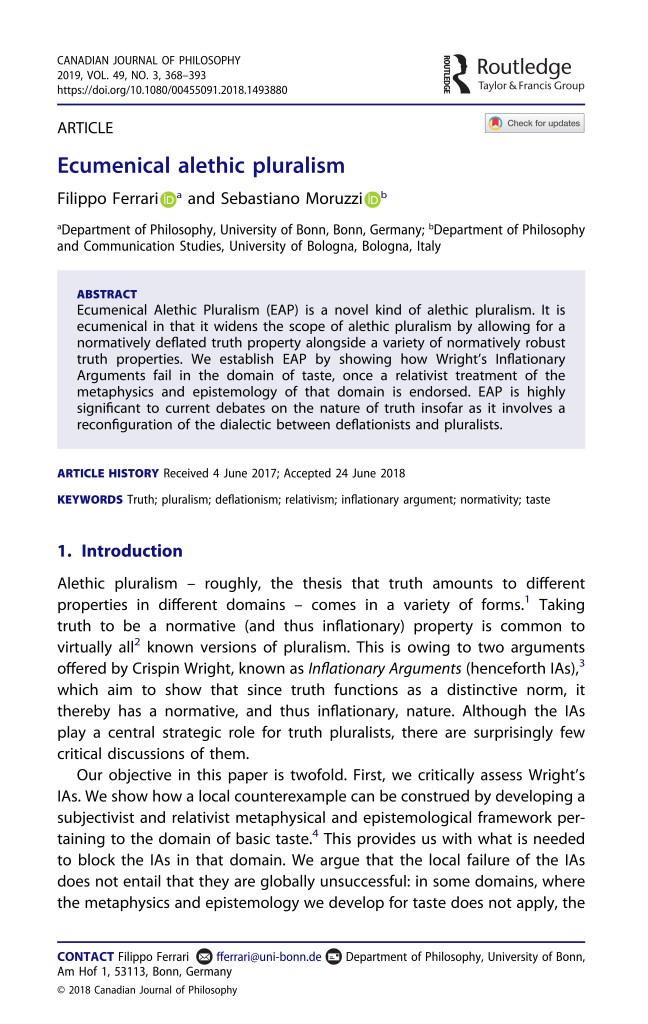
Epistemic peer disagreement (with N.J.L.L. Pedersen) <paper>,<draft>
Routledge Handbook of Social Epistemology (2019)
Abstract
What is the epistemically rational response in the face of mutually recognised disagreement? Why should we think that disagreement is of philosophical significance? One reason is that disagreement functions as a sort of litmus paper for detecting the presence of error. The exact nature and significance of this error need to be scrutinised. To that end, we offer a critical survey of the most discussed accounts of epistemic peer disagreement and we sketch an alternative approach in line with a pluralist understanding of epistemic rationality.
Keywords
Disagreement • Rationality • Justification • Peerage
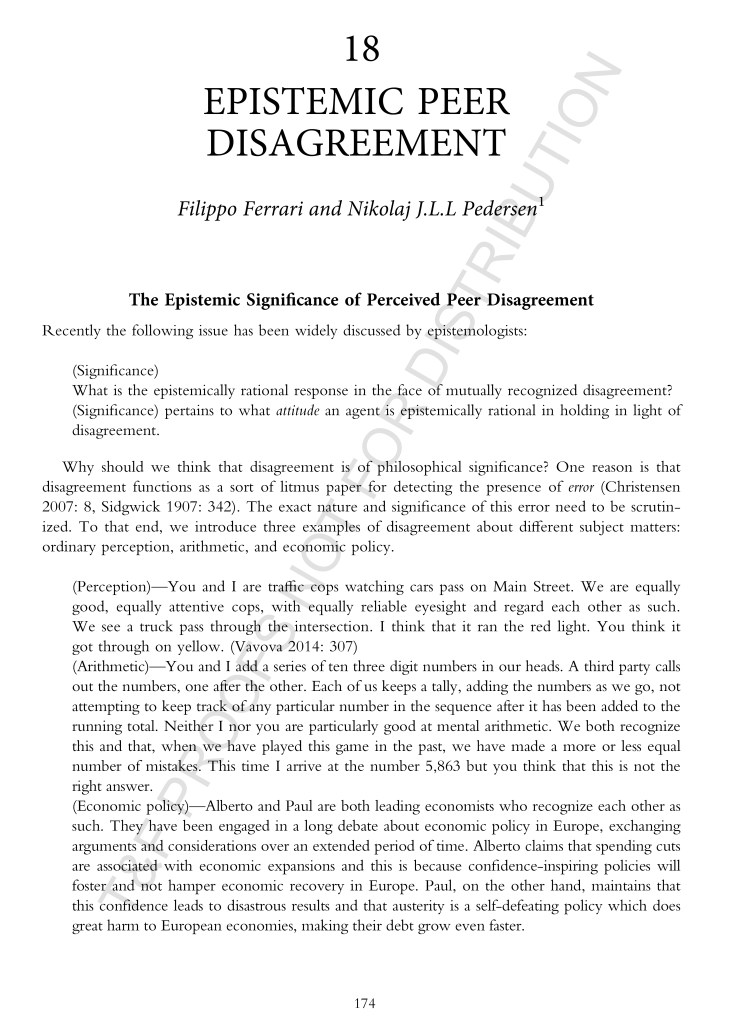
The Value of Minimalist Truth <paper>, <draft>
Synthese (2018)
Vol. 195: 1103–1125
Abstract
It is usually contended that Horwich’s minimalism cannot account for the value of truth. I first provide some clarifications of what we mean exactly when we say that truth is valuable. To this end, I elaborate a framework within which to conduct investigations into the value of truth. With reference to the exchange between Horwich and Lynch on the issue, I discuss the link between questions concerning the explanatory role of truth and the issue of its metaphysical inflation. I conclude by briefly exploring a few strategies on behalf of minimalists to address the axiological challenge.
Keywords
Truth • Minimalism • Axiology

Normative Alethic Pluralism <paper>, <draft>
Pluralisms in Truth and Logic – Palgrave (2018)
Abstract
Some have argued that truth is a norm of judgement. This thesis has been given in a variety of formulations. I will assume that truth functions as a norm of judgement for then focusing on two core questions concerning the judgement-truth norm—namely: (i) what are the normative relationships between truth and judgement? (ii) Do these relationships vary or are they constant? I argue for a pluralist picture—normative alethic pluralism—according to which (i) there is more than one correct judgement-truth norm and (ii) the normative relationships between truth and judgement vary in relation to the subject matter of the judgement.
Keywords
Truth • Pluralism • Normativity • Disagreement

Talking with Vultures (with C. Wright) <paper>, <draft>
Mind (2017)
Vol. 126 (503): 911–936
Abstract
The impetus to relativism in the area of taste, we suggest, is a resolution of the forces exerted by three ingredient assumptions: a truth-conditional conception of the content of the claims put forward in the kind of prima facie disagreement illustrated; an acceptance that such a prima facie disagreement is a genuine one; and a rejection of the idea that the world bestows determinate truth-values on the contents thereby in dispute. Expressivism drops the first assumption; contextualism the second; naïve realism the third. But relativism allows us to accept all three. With reference to “Relativism and Monadic Truth” by Cappelen & Hawthorne, we critically assess truth relativism and suggest a novel minimalist proposal of judgements about taste which promises to fare better than the alternatives.
Keywords
Truth • Relativism • Contextualism • Disagreement
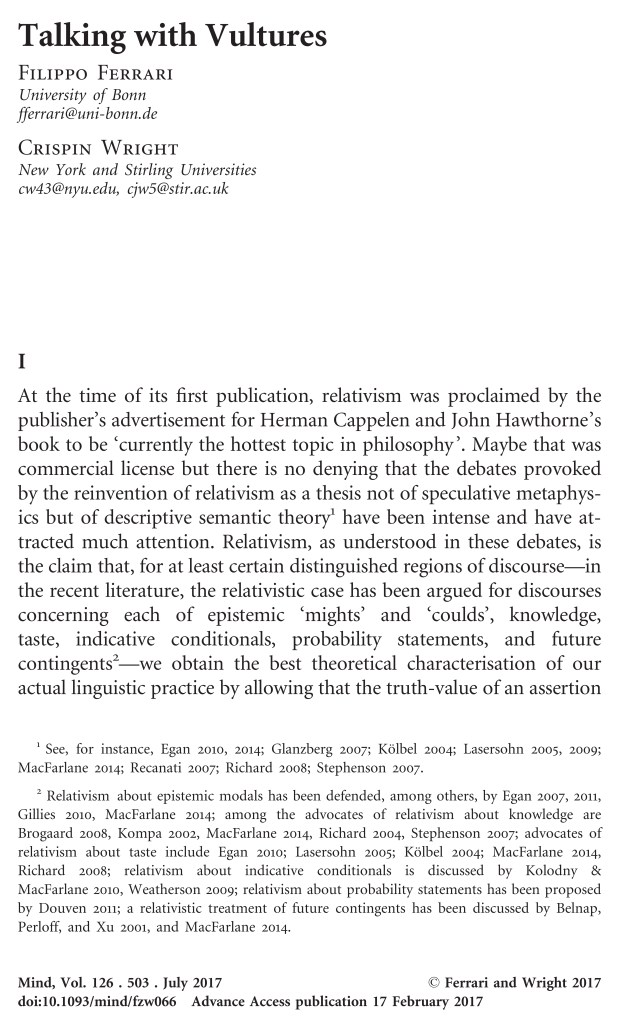
Logical Pluralism, Indeterminacy and the Normativity of Logic (with S. Moruzzi) <paper>, <draft>
Inquiry (2017)
Abstract
Beall and Restall (2006) argues that there is a plurality of logical consequence relations each of which yields a different logic. We are interested in understanding the consequences of endorsing Beall and Restall’s logical pluralism vis-à-vis the normative guidance that logic is taken to provide to reasoning. We will interpret Beall and Restall’s pluralism as a thesis of semantic indeterminacy of our concept of logical consequence. We then elaborate and critically scrutinise three models of semantic indeterminacy. We conclude by arguing that Beall and Restall’s indeterminate logical pluralism cannot offer an adequate account of the normative guidance that logic is taken to provide us with in ordinary contexts of reasoning.
Keywords
Logical pluralism • Logical Consequence • Normativity • Indeterminacy • Vagueness

Disagreement about Taste and Alethic Suberogation <paper>, <draft>
The Philosophical Quarterly
Vol. 66 (264): 516-535
Abstract
I present a novel strategy to account for two thoughts concerning disagreements about taste: (i) that they need not involve any substantive fault (faultlessness); and (ii) that the faultlessness of a contrary opinion can be coherently appreciated from within a committed perspective (parity). I distinguish between different ways in which truth governs judgement to substantiate the thesis that truth’s normative function varies according to the subject matter at issue. I then argue that truth’s normative guidance in the domain of taste is characteristically weak. I introduce an intuitive distinction between basic and refined taste, and show how this distinction affects questions of faultlessness and parity by means of the idea of alethic suberogation.
Keywords
Truth • Disagreement • Taste • Normativity • Faultlessness • Relativism

Assessment Sensitivity <paper>, <draft>
Analysis
76 (4): 516-527
Abstract
This paper offers a critical discussion of some of the themes at the core of John MacFarlane’s “Assessment Sensitivity”. Among other things, I challenge especially MacFarlane’s understanding of the phenomenon of retraction, his treatment of disagreement as preclusion of joint accuracy in the domain of basic taste, and the general normative setup of assessment relativism.
Keywords
Relativism • Disagreement • Retraction • Normativity

Relativism, Faultlessness and Parity <paper>, <draft>
Argumenta (2016)
Vol. 2, 1: 77-94
Abstract
Boghossian and Richard have argued that truth relativism cannot account for the possibility of faultless disagreement. I will contend that the objections they moved against relativism do not target its ability to account for the possibility of faultless disagreement but rather its capacity to account for another aspect of disagreement in certain areas of discourse—what Wright has dubbed parity. I will then argue that once Boghossian and Richard’s arguments are properly understood as targeting parity they are successful. I conclude by offering a diagnosis of what is at the heart of the relativist inability to account for parity—namely its assumption of a monistic conception of the normativity of truth.
Keywords
Truth • Relativism • Faultless Disagreement • Parity • Normative Pluralism

Truth and Naturalism (with D. Edwards & M. Lynch) <paper>, <draft>
Blackwell Companion to Naturalism
Chapter 18: 246-261
Abstract
We address the issue of whether truth is a natural phenomenon. We focus primarily on the kinds of theory of truth that occupy the central positions in current debates about truth, namely correspondence theories, deflationary theories, epistemic theories, and pluralist theories, and aim to discern the extent to which truth is a natural property on each view. We will close by making some brief remarks on how the possible normativity of truth bears on the question of whether truth is a natural property.
Keywords
Truth • Naturalism • Armstrong • Lewis • Normativity
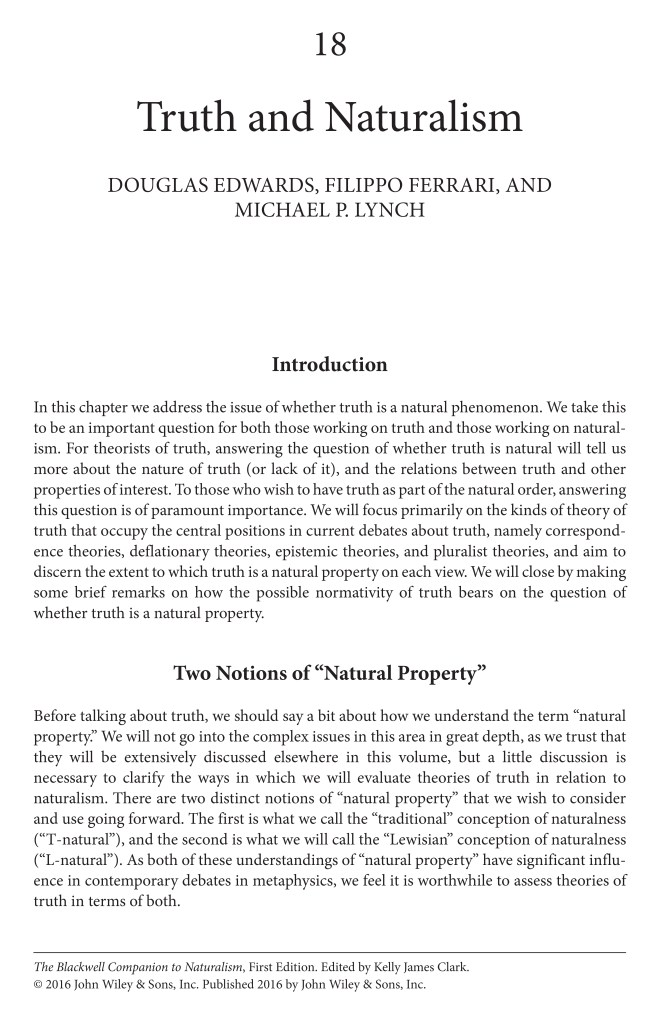
Radical Relativism, Retraction, and “Being at Fault” (with D. Zeman) <draft>
New Frontiers in Truth – Cambridge
Chapter 5: 80-102
Abstract
We provide a novel and substantive analysis of the phenomenon of retraction, at the core of MacFarlane’s assessment relativism. Such analysis, we claim, has the virtue of making clear what the normative peculiarity of the notion of retraction is—namely, its retroactive efficacy. We then discuss the kind of “fault” in which retractors are said to deem their former selves as not being at fault when making the retracted assertion. In this connection, we highlight an asymmetry between retractions involving predicates of personal taste and moral terms.
Keywords
Relativism • Disagreement • Retraction • Normativity

Disagreement and the Normativity of Truth beneath Cognitive Command <thesis>
University of Aberdeen (2014)
Abstract
This thesis engages with three topics and the relationships between them: (i) the phenomenon of disagreement (paradigmatically, where one person makes a claim and another denies it); (ii) the normative character of disagreements (the issue of whether, and in what sense, one of the parties is “at fault” for believing something that’s untrue); (iii) the issue of which theory of what truth is can best accommodate the norms relating belief and truth. I develop and defend a novel pluralist picture of the normative role of truth in enquiry and I show how truth’s variable normative function can be integrated within a minimalist account of the nature of truth.
Keywords
Disagreement • Truth • Normativity • Relativism • Minimalism
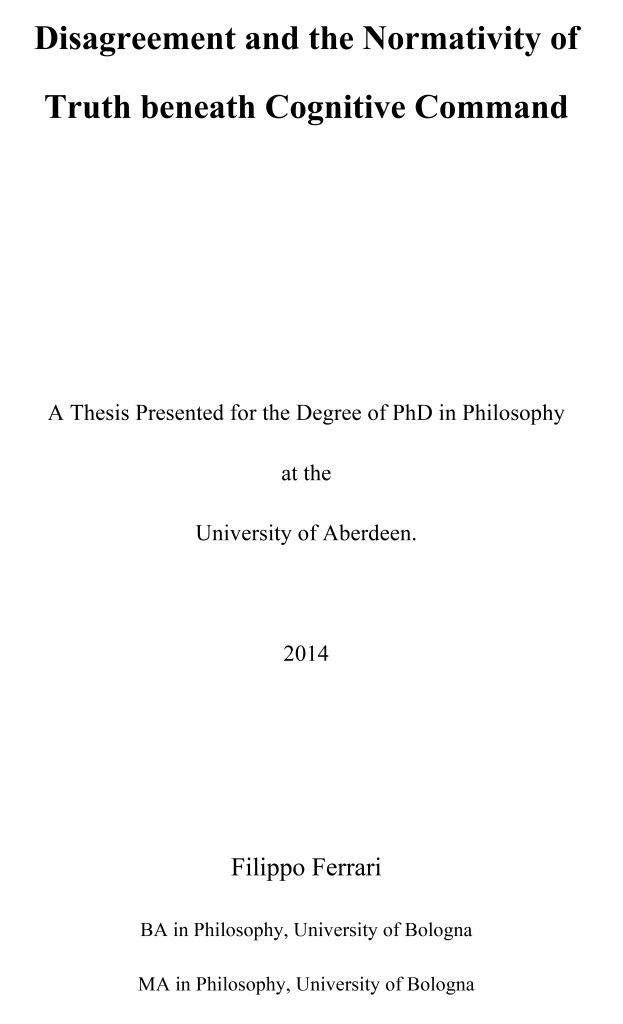
Relative Truth <paper>
Disputatio (2010)
Vol. 3 (28): 334-343
Abstract
This is a critical review of “Relative Truth”, a collection of essays on relativism about truth edited by Manuel García-Carpintero and Max Kölbel, and published by Oxford University Press.
Keywords
Truth • Relativism • Semantics • Disagreement
